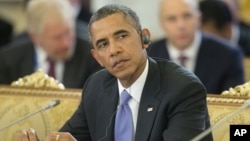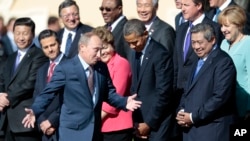U.S. President Barack Obama is pressing world leaders at the Group of 20 summit in Russia for backing of a possible U.S. strike on Syria.
Russian President Vladimir Putin announced plans to add Syria to the agenda shortly after summit participants arrived Thursday in St. Petersburg.
In an opening session, Putin said some leaders had asked him to set aside time to discuss "very acute topics of international politics," in particular Syria. He said talks could take place during Thursday's working dinner (approximately 16:00 UTC).
The Syrian crisis is not on the official agenda for the two-day global economic summit, but Obama and other leaders have been discussing the issue on the sidelines.
The president is seeking broader support, both at home and abroad, for military strikes against Syria's government for allegedly using chemical weapons on its civilians.
Obama commented on Syria as he headed into a meeting with Japanese Prime Minister Shinzo Abe.
"I also look forward to having an extensive conversation about the situation in Syria and I think our joint recognition that the use of chemical weapons in Syria is not only a tragedy but a violation of international law that must be addressed," he said.
After the session, White House advisor Ben Rhodes said the two leaders were in agreement that the Syrian crisis demanded a strong international response.
On Wednesday, Putin warned Western strikes without U.N. Security Council approval would be an unacceptable "aggression." But he said he would support a strike if there were "convincing" proof that Damascus used chemical weapons.
White House adviser Ben Rhodes says there are currently no plans for a bilateral meeting between Obama and Putin, but there will be opportunities for "interactions" between the two leaders on the sidelines of the summit.
Rhodes told reporters on Air Force One en route to the summit the United States will continue to present evidence to Russia that the Syrian regime was behind the attack, but will not "entertain implausible theories."
Russia has been a key ally to Syria. Russia says Syrian Foreign Minister Walid al-Moallem is traveling to Moscow for talks on Monday about the crisis.
Russia and China have already vetoed three U.N. Security Council resolutions that would have punished President Assad's government.
The U.S. hosted a series of briefings at the U.N. Thursday. Afterwards, U.S. Ambassador Samantha Power said Russia continues to hold the Security Council hostage on Syria, and shirk [avoid] its international responsibility.
"There is nothing in the pattern of our interactions with our colleagues in the Security Council, our Russian colleagues, that would give us any reason to be optimistic," she said. "And, indeed, we have seen nothing in President Putin’s comments that suggests there is an available path forward at the Security Council."
Speaking before the summit, Chinese Vice Finance Minister Zhu Guangyao said Thursday any military action against Syria would cause a hike in oil prices and have a "negative impact" on the global economy.
Lawmakers in the U.S. Senate could begin debate next week on a measure calling for limited military strikes on Syria. On Wednesday, a key Senate panel approved the plan, which also rules out deploying U.S. ground troops to the country.
U.N. officials continue to look for a political settlement to the conflict.
Officials say U.N.-Arab League envoy on Syria Lakhdar Brahimi is headed to St. Petersburg to help U.N. chief Ban Ki-moon organize a Syrian peace conference.
Also, U.S. Secretary of State John Kerry will discuss Syria's crisis with European Union and Arab League representatives during a visit to Europe next week.
Russian President Vladimir Putin announced plans to add Syria to the agenda shortly after summit participants arrived Thursday in St. Petersburg.
In an opening session, Putin said some leaders had asked him to set aside time to discuss "very acute topics of international politics," in particular Syria. He said talks could take place during Thursday's working dinner (approximately 16:00 UTC).
The Syrian crisis is not on the official agenda for the two-day global economic summit, but Obama and other leaders have been discussing the issue on the sidelines.
The president is seeking broader support, both at home and abroad, for military strikes against Syria's government for allegedly using chemical weapons on its civilians.
Obama commented on Syria as he headed into a meeting with Japanese Prime Minister Shinzo Abe.
"I also look forward to having an extensive conversation about the situation in Syria and I think our joint recognition that the use of chemical weapons in Syria is not only a tragedy but a violation of international law that must be addressed," he said.
After the session, White House advisor Ben Rhodes said the two leaders were in agreement that the Syrian crisis demanded a strong international response.
On Wednesday, Putin warned Western strikes without U.N. Security Council approval would be an unacceptable "aggression." But he said he would support a strike if there were "convincing" proof that Damascus used chemical weapons.
White House adviser Ben Rhodes says there are currently no plans for a bilateral meeting between Obama and Putin, but there will be opportunities for "interactions" between the two leaders on the sidelines of the summit.
Rhodes told reporters on Air Force One en route to the summit the United States will continue to present evidence to Russia that the Syrian regime was behind the attack, but will not "entertain implausible theories."
Russia has been a key ally to Syria. Russia says Syrian Foreign Minister Walid al-Moallem is traveling to Moscow for talks on Monday about the crisis.
Russia and China have already vetoed three U.N. Security Council resolutions that would have punished President Assad's government.
The U.S. hosted a series of briefings at the U.N. Thursday. Afterwards, U.S. Ambassador Samantha Power said Russia continues to hold the Security Council hostage on Syria, and shirk [avoid] its international responsibility.
"There is nothing in the pattern of our interactions with our colleagues in the Security Council, our Russian colleagues, that would give us any reason to be optimistic," she said. "And, indeed, we have seen nothing in President Putin’s comments that suggests there is an available path forward at the Security Council."
Speaking before the summit, Chinese Vice Finance Minister Zhu Guangyao said Thursday any military action against Syria would cause a hike in oil prices and have a "negative impact" on the global economy.
Lawmakers in the U.S. Senate could begin debate next week on a measure calling for limited military strikes on Syria. On Wednesday, a key Senate panel approved the plan, which also rules out deploying U.S. ground troops to the country.
U.N. officials continue to look for a political settlement to the conflict.
Officials say U.N.-Arab League envoy on Syria Lakhdar Brahimi is headed to St. Petersburg to help U.N. chief Ban Ki-moon organize a Syrian peace conference.
Also, U.S. Secretary of State John Kerry will discuss Syria's crisis with European Union and Arab League representatives during a visit to Europe next week.






